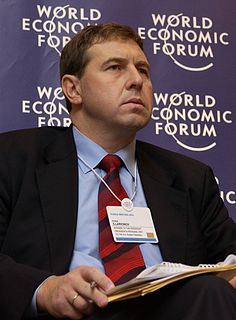A Quote by Tom Wigley
Three scenarios for post-Kyoto emissions reductions indicate that ... the long-term consequences are small... The influence of the Protocol would, furthermore, be undetectable for many decades.
Related Quotes
The Bush Administration believes the Kyoto protocol could damage our collective prosperity, and in so doing, actually put our long-term environmental health at risk. Fundamentally, we believe that the protocol both will fail to significantly reduce the long-term risks posed by climate change and, in the short run, will seriously impede our ability to meet our energy needs and economic growth.
Globally, emissions may have to be reduced, the scientists are telling us, by as much as 60% or 70%, with developed countries likely to have to make even bigger cuts if we're going to allow the developing world to have their share of growing industrial prosperity...The Kyoto Protocol is only the first rather modest step. Much, much deeper emission reductions will be needed in future. The political implications are mind-blowing.
The impact of the Kyoto Protocol on global temperature is quite modest, especially for the first century. The reduction in global mean temperature in the Annex I case relative to the reference in 2100 is 0.13ºC; this compares with a difference of 0.17ºC from the Kyoto Protocol calculated by Wigley. The temperature reduction in the optimal run is essentially the same as the Kyoto runs by the 22nd century.
Sensible policies on global warming should weight the costs of slowing climate change against the benefits of slower climate change. Ironically, recent policy initiatives, such as the Kyoto Protocol of 1997, have been introduced without any attempt to link the emissions controls with the benefits of the lower emissions.
Ideology on which the Kyoto Protocol is based, is a new form of totalitarian ideology, along with Marxism, Communism and socialism. We had doubts about the Kyoto Protocol, we wanted reasoning from our partners in the European Union, in the IPCC. Formal requests had been sent to these organizations. But we have not received responses yet, which suggests that no coherent answers can be offered. What we hear is 'it is not comprehensive responses that matter, we will not give them anyway; what is important is whether you believe us or not'.
With each passing year the difficulty of meeting any fixed quantitative target increases progressively. Moreover, plausible estimates of when the Protocol would go into effect leave such a small window of time before the first commitment period that achievement of the Kyoto targets will eventually pass out of reach.
Every time I would arrive in China I would go through a few days of depression from being reminded of both short-term and long-term ruin; the ruining of the city that is happening in the short-term, and the ruining of culture and history that has happened over decades. When you see a building that says so much about the culture that built it being destroyed, there are a lot of emotions. You feel a lot of anger when you see a building being destroyed and realize that it's just a small part of what's going on in the entire country.
On Earth Day I made a commitment to reduce our emissions of greenhouse gases to 1990 levels by the year 2000. And I asked for a blueprint on how to achieve this goal. In concert with all other nations, we simply must halt global warming. It is a threat to our health, to our ecology, and to our economy. I know that the precise magnitude and patterns of climate change cannot be fully predicted. But global warming clearly is a growing, long-term threat with profound consequences. And make no mistake about it, it will take decades to reverse.
Thus a long term corporate bond could actually be sold to three separate persons. One would supply the money for the bond; one would bear the interest rate risk, and one would bear the risk of default. The last two would not have to put up any capital for the bond, though they might have to post some sort of collateral.



































